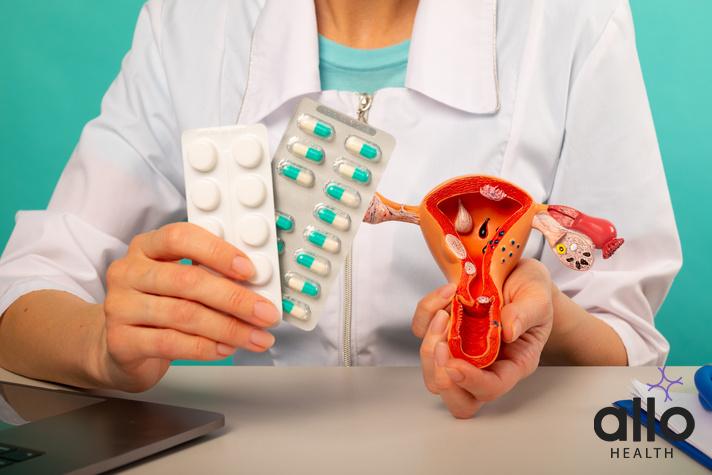Managing Mycoplasma genitalium (MG): Coping and Psychological Support

"The following blog article provides general information and insights on various topics. However, it is important to note that the information presented is not intended as professional advice in any specific field or area. The content of this blog is for general educational and informational purposes only.
Book consultation
The content should not be interpreted as endorsement, recommendation, or guarantee of any product, service, or information mentioned. Readers are solely responsible for the decisions and actions they take based on the information provided in this blog. It is essential to exercise individual judgment, critical thinking, and personal responsibility when applying or implementing any information or suggestions discussed in the blog."
Understanding Mycoplasma Genitalium
Mycoplasma genitalium (MG) is a sexually transmitted bacterium that can cause various urogenital infections in both men and women. Despite being less well-known than other sexually transmitted infections (STIs), MG is becoming increasingly significant due to its growing prevalence and resistance to antibiotics. Symptoms can include urethritis in men and cervicitis in women, along with potential complications like pelvic inflammatory disease (PID), which can lead to infertility. However, many individuals with MG may be asymptomatic, making the infection challenging to detect and manage.
The Psychological Impact of MG

Being diagnosed with MG or any STI can have profound psychological effects. Feelings of shame, guilt, anxiety, and fear are common. These emotions can stem from societal stigmas surrounding STIs, concerns about sexual health, and the potential impact on intimate relationships. Addressing the psychological aspects of an MG diagnosis is crucial for overall well-being and effective management of the condition.
Coping Strategies for MG Diagnosis
-
Education and Information
Understanding MG is the first step towards managing it effectively. Patients should seek comprehensive information about the infection, its symptoms, transmission, and treatment options. Healthcare providers play a crucial role in educating patients and addressing their concerns. Reliable sources such as the Centers for Disease Control and Prevention (CDC) and the World Health Organization (WHO) offer valuable information.
-
Open Communication with Healthcare Providers
Establishing a trusting relationship with healthcare providers is essential. Patients should feel comfortable discussing their symptoms, concerns, and treatment options. Open communication ensures that individuals receive appropriate medical advice, timely diagnosis, and effective treatment plans. Patients should not hesitate to ask questions and seek clarification about their condition.
-
Emotional Support from Loved Ones
Sharing the diagnosis with trusted friends or family members can provide emotional support. Loved ones can offer comfort, understanding, and a sense of solidarity during a challenging time. Their support can alleviate feelings of isolation and anxiety, helping individuals cope better with the diagnosis.
Treatment and Management of MG

-
Medical Treatment
The primary treatment for MG involves antibiotics. However, antibiotic resistance is a growing concern, making treatment more complex. Azithromycin and doxycycline are commonly prescribed, but their effectiveness can vary. In cases of antibiotic resistance, alternative medications like moxifloxacin may be used. Patients must follow their healthcare provider’s treatment plan and complete the prescribed course of antibiotics, even if symptoms improve.
-
Regular Follow-Up
Regular follow-up appointments are vital to monitor the progress of the treatment and ensure the infection is fully eradicated. Patients should adhere to follow-up schedules and inform their healthcare provider of any persistent or recurring symptoms. Retesting may be necessary to confirm the effectiveness of the treatment.
Psychological Support for MG Patients
-
Counseling and Therapy
Professional counseling or therapy can be immensely beneficial for individuals struggling with the psychological impact of an MG diagnosis. Mental health professionals can help patients navigate their emotions, develop coping mechanisms, and build resilience. Cognitive-behavioral therapy (CBT) is particularly effective in addressing anxiety and negative thought patterns related to the diagnosis.
-
Support Groups
Joining support groups can provide a sense of community and understanding. Interacting with others who have similar experiences can reduce feelings of isolation and offer practical advice on managing the condition. Online forums and local support groups can be valuable resources for finding support and sharing experiences.
-
Stress Management Techniques
Practicing stress management techniques can help individuals cope with the emotional burden of an MG diagnosis. Techniques such as mindfulness meditation, deep breathing exercises, and yoga can reduce stress and promote mental well-being. Engaging in hobbies, and physical activities, and spending time with loved ones can also improve mood and reduce anxiety.
Maintaining a Healthy Lifestyle
-
Healthy Diet and Exercise
A balanced diet and regular exercise are essential for overall health and well-being. Proper nutrition and physical activity can boost the immune system, improve energy levels, and enhance mood. Individuals should aim to incorporate a variety of fruits, vegetables, lean proteins, and whole grains into their diet, along with regular physical activity.
-
Safe Sexual Practices
Practicing safe sex is crucial in preventing the transmission of MG and other STIs. Consistent and correct use of condoms significantly reduces the risk of transmission. Patients should inform their sexual partners about their diagnosis and encourage them to get tested and treated if necessary. Regular STI screenings are also important for sexually active individuals.
Reducing Stigma and Promoting Awareness
-
Breaking the Stigma
Societal stigmas surrounding STIs can exacerbate the emotional distress of an MG diagnosis. Education and awareness campaigns are essential to reduce stigma and promote understanding. Open conversations about sexual health, routine screenings, and safe sex practices can help normalize the discussion around STIs and encourage individuals to seek timely medical care.
-
Community Engagement
Community engagement and support from healthcare organizations, educational institutions, and advocacy groups can play a significant role in raising awareness about MG. Collaborative efforts can lead to better access to information, resources, and healthcare services, ultimately improving the management and prevention of MG.
Managing Mycoplasma genitalium involves addressing the infection’s physical aspects and the psychological and emotional challenges it brings. Education, open communication with healthcare providers, and emotional support from loved ones are crucial for effective coping. Medical treatment, regular follow-up, and psychological support through counseling, support groups, and stress management techniques can significantly enhance the quality of life for individuals with MG. Promoting a healthy lifestyle, practicing safe sex, and reducing stigma through awareness and community engagement are essential steps toward better management and prevention of this infection. By addressing MG’s physical and emotional aspects, individuals can lead healthier, more fulfilling lives.









































